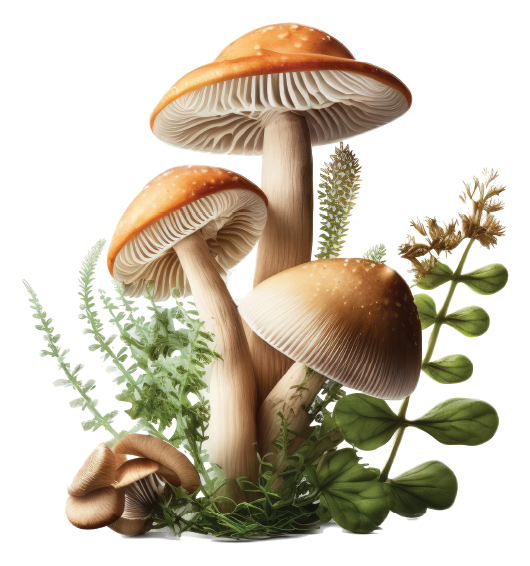The ASCO Post’s Integrative Oncology series is intended to facilitate the availability of evidence-based information on integrative and complementary therapies sometimes used by patients with cancer. In this installment, Yen Nien (Jason) Hou, PharmD, DiplOM, LAc, and Jyothirmai Gubili, MS, focus on the use of psilocybin—a naturally occurring psychedelic prodrug compound—given the growing interest in its use for mood disorders.

Yen Nien (Jason) Hou, PharmD, DiplOM, LAc

Jyothirmai Gubili, MS
Scientific Name: 3-[2-(dimethylamino)ethyl]-1H-indol-4-yl dihydrogen phosphate
Common Names: Magic mushrooms, Shrooms, Boomers, Buttons, Purple passion, Mushies
Overview
An indole alkaloid, psilocybin is found in more than 200 species of fungi, commonly referred to as magic mushrooms. Historically used for religious ceremonies and healing rituals by Mesoamerican cultures, these mushrooms are consumed for their hallucinogenic effects, added to other foods to mask their bitter taste, or brewed as teas.
Although psilocybin is a Schedule I substance because of its high potential for abuse, there has been a recent surge in clinical research given the renewed interest in its therapeutic potential. It has been reported to produce highly spiritual states of consciousness, with long-acting positive changes in behavior, cognition, and affect.1
Guest Editor

Jun J. Mao, MD, MSCE
Dr. Mao is the Laurance S. Rockefeller Chair in Integrative Medicine and Chief of Integrative Medicine Service at Memorial Sloan Kettering Cancer Center, New York.
The Science
Data from randomized controlled trials indicate that psilocybin-assisted therapy is beneficial in the treatment of tobacco use disorder,2 alcohol use disorder,3 and treatment-resistant depression.4-7 Systematic reviews or meta-analyses determined that psilocybin may help to improve end-of-life anxiety,1 may have positive effects on quality of life and acceptance in terminally ill patients,8 and may be equally effective as escitalopram in those with long-standing depression.9 In addition, preliminary findings suggest benefits in individuals with obsessive compulsive disorder,10 cluster headaches,11 migraines,12 and demoralization following an AIDS diagnosis.13
In oncology settings, psilocybin has affected reductions in suicidal ideation, and depression and anxiety14,15 in patients with psychological distress. Of note, the reductions in depression were positively correlated with mystical experience, characterized by deep feelings of meaning or sacredness and a positive mood.14
OF NOTE
Physicians should be aware of the growing patient interest in psilocybin; the lack of clear guidelines and regulations surrounding its use; and of potential acute psychological distress when it is used in uncontrolled environments.
Studies on the effects of microdosing—consuming very low doses of psychedelics for improving mood, creativity, and cognitive function—on mood and mental health are mixed.16,17 Given the increasing public interest and acceptance of psychedelic therapies, larger trials with rigorous methodology, research on long-term effects, and clear regulations/guidelines are needed to guide future clinical practice.
The precise mechanisms by which psilocybin exerts its effects are not fully understood. The active metabolite of psilocybin—psilocin—is known to alter one’s awareness of surroundings, thoughts, and feelings. These effects are generated primarily via serotonin (5-hydroxytryptamine) type 2A receptor agonism, a pathway implicated in depression.18 In addition, psilocybin is believed to reduce negative affect and the neural correlates of negative affect.19
Adverse Reactions
Transient headache the day after treatment with psilocybin, increase in blood pressure and heart rate, anxiety, confusion, fatigue, nausea, vomiting, dizziness, and suicidal ideation or behavior or self-injury have been reported in clinical studies.20,21
Cases of Takotsubo cardiomyopathy (a temporary heart condition that develops in response to an intense emotional or physical experience),22 rhabdomyolysis,23 prolonged mania, psychosis and severe depression,24 unpredictable behavior,25 and manic episode,26 have also been associated with the use of psilocybin.

Herb-Drug Interactions
Antidepressants/Antipsychotics: Simultaneous use with psilocybin may cause heightened or blunted psychedelic experience.27
Serotonergic Drugs: Concurrent use with psilocybin may result in serotonin syndrome, in which excessive serotonin signaling can potentially lead to a life-threatening adverse reaction.20
UGT Substrates: Because psilocin is metabolized by UGT1A10 and 1A, it should not be taken with medications that inhibit or induce UGT enzymes.28
Summary
Although controversial, psilocybin was granted Breakthrough Therapy designation by the U.S. Food and Drug Administration in 2018 for treatment-resistant depression and in 2019 for major depressive disorder. Oregon became the first state both to decriminalize and legalize psilocybin for therapeutic use, with ballot initiatives underway in Colorado and California.
Psilocybin can cause acute psychological distress, dangerous behavior, and sustained psychological discomfort in uncontrolled environments, despite its lower potential of addiction and lower risk of adverse effects compared with other psychoactive drugs.29 Continued research and clinical practice guidelines may help to ensure its appropriate use.
DISCLOSURE: Dr. Hou and Ms. Gubili reported no conflicts of interest.
REFERENCES
1. Yu CL, Yang FC, Yang SN, et al: Psilocybin for end-of-life anxiety symptoms: A systematic review and meta-analysis. Psychiatry Investig 18:958-967, 2021.
2. Johnson MW, Garcia-Romeu A, Griffiths RR: Long-term follow-up of psilocybin-facilitated smoking cessation. Am J Drug Alcohol Abuse 43:55-60, 2017.
3. Bogenschutz MP, Forcehimes AA, Pommy JA, et al: Psilocybin-assisted treatment for alcohol dependence: A proof-of-concept study. J Psychopharmacol 29:289-299, 2015.
4. Carhart-Harris RL, Bolstridge M, Rucker J, et al: Psilocybin with psychological support for treatment-resistant depression: An open-label feasibility study. Lancet Psychiatry 3:619-627, 2016.
5. Carhart-Harris RL, Bolstridge M, Day CMJ, et al: Psilocybin with psychological support for treatment-resistant depression: Six-month follow-up. Psychopharmacology (Berl) 235:399-408, 2018.
6. Carhart-Harris R, Giribaldi B, Watts R, et al: Trial of psilocybin versus escitalopram for depression. N Engl J Med 384:1402-1411, 2021.
7. Davis AK, Barrett FS, May DG, et al: Effects of psilocybin-assisted therapy on major depressive disorder: A randomized clinical trial. JAMA Psychiatry 78:481-489, 2021.
8. Schimmers N, Breeksema JJ, Smith-Apeldoorn SY, et al: Psychedelics for the treatment of depression, anxiety, and existential distress in patients with a terminal illness: A systematic review. Psychopharmacology (Berl) 239:15-33, 2022.
9. Kisely S, Connor M, Somogyi AA, et al: A systematic literature review and meta-analysis of the effect of psilocybin and methylenedioxymethamphetamine on mental, behavioural or developmental disorders. Aust N Z J Psychiatry 57:362-378, 2023.
10. Moreno FA, Wiegand CB, Taitano EK, et al: Safety, tolerability, and efficacy of psilocybin in 9 patients with obsessive-compulsive disorder. J Clin Psychiatry 67:1735-1740, 2006.
11. Schindler EAD, Gottschalk CH, Weil MJ, et al: Indoleamine hallucinogens in cluster headache: Results of the Clusterbusters Medication Use Survey. J Psychoactive Drugs 47:372-381, 2015.
12. Schindler EAD, Sewell RA, Gottschalk CH, et al: Exploratory controlled study of the migraine-suppressing effects of psilocybin. Neurotherapeutics 18:534-543, 2021.
13. Anderson BT, Danforth A, Daroff R, et al: Psilocybin-assisted group therapy for demoralized older long-term AIDS survivor men: An open-label safety and feasibility pilot study. EClinicalMedicine 27:100538, 2020.
14. Griffiths RR, Johnson MW, Carducci MA, et al: Psilocybin produces substantial and sustained decreases in depression and anxiety in patients with life-threatening cancer: A randomized double-blind trial. J Psychopharmacol 30:1181-1197, 2016.
15. Ross S, Bossis A, Guss J, et al: Rapid and sustained symptom reduction following psilocybin treatment for anxiety and depression in patients with life-threatening cancer: A randomized controlled trial. J Psychopharmacol 30:1165-1180, 2016.
16. Ryan RS, Copello A, Fox AP: Experiences of microdosing psychedelics in an attempt to support wellbeing and mental health. BMC Psychiatry 23:160, 2023.
17. Cavanna F, Muller S, de la Fuente LA, et al: Microdosing with psilocybin mushrooms: A double-blind placebo-controlled study. Transl Psychiatry 12:307, 2022.
18. Johnson MW, Hendricks PS, Barrett FS, et al: Classic psychedelics: An integrative review of epidemiology, therapeutics, mystical experience, and brain network function. Pharmacol Ther 197:83-102, 2019.
19. Barrett FS, Doss MK, Sepeda ND, et al: Emotions and brain function are altered up to one month after a single high dose of psilocybin. Sci Rep 10:2214, 2020.
20. Johnson M, Richards W, Griffiths R: Human hallucinogen research: Guidelines for safety. J Psychopharmacol 22:603-620, 2008.
21. Griffiths RR, Johnson MW, Richards WA, et al: Psilocybin occasioned mystical-type experiences: Immediate and persisting dose-related effects. Psychopharmacology (Berl) 218:649-665, 2011.
22. Kotts WJ, Gamble DT, Dawson DK, et al: Psilocybin-induced takotsubo cardiomyopathy. BMJ Case Rep 15:e245863, 2022.
23. Suleiman M, Basu A, Belal S, et al: From mushrooms to myolysis: A case of rhabdo in psilocybin-induced mood and psychotic disorder. J Nerv Ment Dis 210:638-639, 2022.
24. Barber G, Nemeroff CB, Siegel S: A case of prolonged mania, psychosis, and severe depression after psilocybin use: Implications of increased psychedelic drug availability. Am J Psychiatry 179:892-896, 2022.
25. Honyiglo E, Franchi A, Cartiser N, et al: Unpredictable behavior under the influence of ‘magic mushrooms’: A case report and review of the literature. J Forensic Sci 64:1266-1270, 2019.
26. Hendin HM, Penn AD: An episode of mania following self-reported ingestion of psilocybin mushrooms in a woman previously not diagnosed with bipolar disorder: A case report. Bipolar Disord 23:733-735, 2021.
27. Passie T, Seifert J, Schneider U, et al: The pharmacology of psilocybin. Addict Biol 7:357-364, 2002.
28. MacCallum CA, Lo LA, Pistawka CA, et al: Therapeutic use of psilocybin: Practical considerations for dosing and administration. Front Psychiatry 13:1040217, 2022.
29. Carbonaro TM, Bradstreet MP, Barrett FS, et al: Survey study of challenging experiences after ingesting psilocybin mushrooms: Acute and enduring positive and negative consequences. J Psychopharmacol 30:1268-1278, 2016.
Dr. Hou is Manager of the “About Herbs” website, maintained by Memorial Sloan Kettering Cancer Center’s Integrative Medicine Service, and Ms. Gubili is Editor, also at the Integrative Medicine Service, Memorial Sloan Kettering Cancer Center, New York.
About Herbs App
Dietary supplement use by patients with cancer has increased significantly over the past 3 decades despite insufficient evidence of safety and effectiveness. Yet finding reliable sources of information about dietary supplements continues to be daunting. Patients typically rely on family, friends, and the Internet, often receiving misleading information.
The Integrative Medicine Service at Memorial Sloan Kettering developed and maintains a free website About Herbs (www.mskcc.org/aboutherbs) that provides reliable and evidence-based information about herbs, vitamins, minerals and other dietary supplements, as well as unproven anticancer treatments. Each of the 290 and growing number of entries has health-care professional and patient versions that are regularly updated with the latest research findings.
The free About Herbs app is now available on both Android and iOS devices. Download at Google Play for Android devices and the App Store for iOS.

